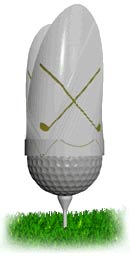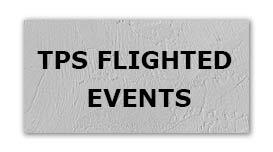|




|
Article
GOODBYE OLD FRIEND!
Mourners pay their respects to legendary caddie Tip Anderson
''GOODBYE, old friend'' was the message from golfing superstar Arnold Palmer at the funeral of one of the game's best known characters in St Andrews on Monday.
Historian and author David Joy read out the message as part of a comprehensive and heartwarming tribute to legendary caddie James 'Tip' Anderson, who died on January 2 at the age of 71.
Prominent St Andreans, golfers and caddies joined relatives and friends for the funeral in Holy Trinity Church in South Street which was was filled with several hundred mourners who gathered to pay their respects.
Tip, who helped American stars Arnold Palmer and Tony Lema to win three Open Championships between them, was born and bred in St Andrews.
His partnership and association for more than 30 years with Palmer was renowned and he was to share in many of Arnold's successes over the years since they first joined forces at the Centenary Open Championship in 1960, including when he won the Open at Birkdale in 1961 and again at Troon in 1962.
Son of a well-known St Andrews caddie, he took a keen interest in the game from an early age and was a talented player as a young man during which time he commenced an apprenticeship as a clubmaker.
He won the St Andrews Boys' Open Championship in 1948 and completed a remarkable double by also collecting the Fife Boys' Championship title the same year. He was a former member of St Andrews Golf Club.
During his national service in the Army, he continued to play golf and secure
titles, winning the Western Command Championship with a four-under par 70 at Formby and also taking the North-West District Army Championship title.
He later returned to clubmaking before becoming a full-time caddie at St Andrews in the 1950s.
Tip held a number of honours during his career as a caddie and was elected Golf Caddie of the Year in the USA in 1965.
At the Millennium Open Championship at St Andrews, he was inducted into the Professional Caddie Association's Hall of Fame.
During the funeral, David Joy also read out a message from the senior caddies of St.Andrews which described Tip as ''such a colourful character, known so well in the golfing world,'' and added: ''We looked upon Tip as a father figure and a role model on the Links of St. Andrews.''
In his own tribute, Mr Joy spoke of Tip's early years, adding: ''He was known to his close friends and family as 'Jim' and to most of us here today as 'Tip,' locally, nationally and internationally in the world of golf.
''His father had the original name of "Tip" - known as the "tipper" in a billiards saloon - Janettas in South Street where he would clean the tables and chalk the cues in the 1930s.''
Mr Joy told the assembled gathering that Tip's first memory of the Open Championship was as a 13-year-old page boy at The Scores Hotel when he looked out of the main lounge window, which overlooked the scoreboard for 1946 - in The Bow Butts. He was anxious to see how the renowned amateur Andrew Dowie was doing, as his father was caddying for him.
Mr Joy added: ''Four months after working in The Scores, Tip was moved to Rusacks in the same job. The American Walker Cup team stayed there in 1947 and made a huge impression on the young Tip, so much so that he took up golf aged 14 - late for a local boy.
''Under the guidance of David Ayton - who gave lessons to groups of boys - in just over two years he won the St.Andrews Boys' Championship here and the Fife Boys' Championship at Kinghorn by five shots, a big winning margin as they only played the one round - in breezy conditions he shot 71 - and that was with a finish of double bogey-bogey!
''Before competing for the first time, aged 16, he joined the St.Andrews Golf Club and was given a senior handicap of 12 - two months later the handicap committee decided that was a bit harsh and increased it to 14 . One year later he had won every competition he'd played in and was down to four!''
''Playing in the British Boys Championship at St.Andrews in 1949, after a disasterous front nine, he found himself seven down with eight to play against Roy Mason, the English captain of the International team. Fighting back, but as he said "jist hingin on" he put his second shot at the par five 14th in Kitchen bunker (by the side of Hell) stating "It wasn't lying too good so I gave it a skelp with a seven-iron and hoped for the best" He holed it for an eagle three!
''He managed to keep the game going till the 17th but there was too much ground to make up. Had he won he would have been playing Harry MacAnespie - the eventual winner, which would have been interesting as old Tip was caddying for MacAnespie!''
''Up until the 1960 Open and for a while after it, Tip worked the winter months as "a bookies settler," showing a remarkable agility for mental arithmetic in working out some complicated combinations of odds. He was even offered his own office in Perth but, as he would say on numerous occasions during his life, he didn't want to leave St.Andrews.
Referring to Tip's partnership with Arnold Palmer, Mr Joy recalled: ''Palmer, competing in Ireland for The Canada Cup, through his agents (Wilson Staff) wired Auchterlonies for an experienced local caddy for The Centenary Open. Tip Snr. was recommended but, with all the publicity following Palmer, he worried that it would be too much for him and so asked his son to take the bag.''
Mr Joy described 1964 as the biggest year in Tip's career.
''It's well recorded how Palmer, feeling jaded, didn't come across to St.Andrews for The Open that year but recommended Tip as being worth a few shots to fellow American Tony Lema. He won by five from Jack Nicklaus with only one practise round. In the national and international press Lema declared that it was 49 per cent himself and 51 per cent Tip Anderson. He said: 'Tip put the club in my hand and I just hit it!'
''Palmer put pressure on him to follow him to the Canadian Open. Lema's manager wanted him to go over to the States to appear on the popular panel game, "What's My Line," but he wouldn't go.
''In 1965 he was even voted caddy of the year in America without having been there.
''I can almost hear that famous phrase echo around this church today, when he said time and time again to folk: 'Aye well, you see, I wouldn't fly.'
''It's an old St.Andrews saying that 'he wasnae happy oot o' the shaddie o' the square tower,' and in a way that was true of Tip.
He was comfortable here - he loved this town and knew all the locals in it, and had loyal friends.
''He didn't so much become a character here, as an institution!''
16 January 2004
|






